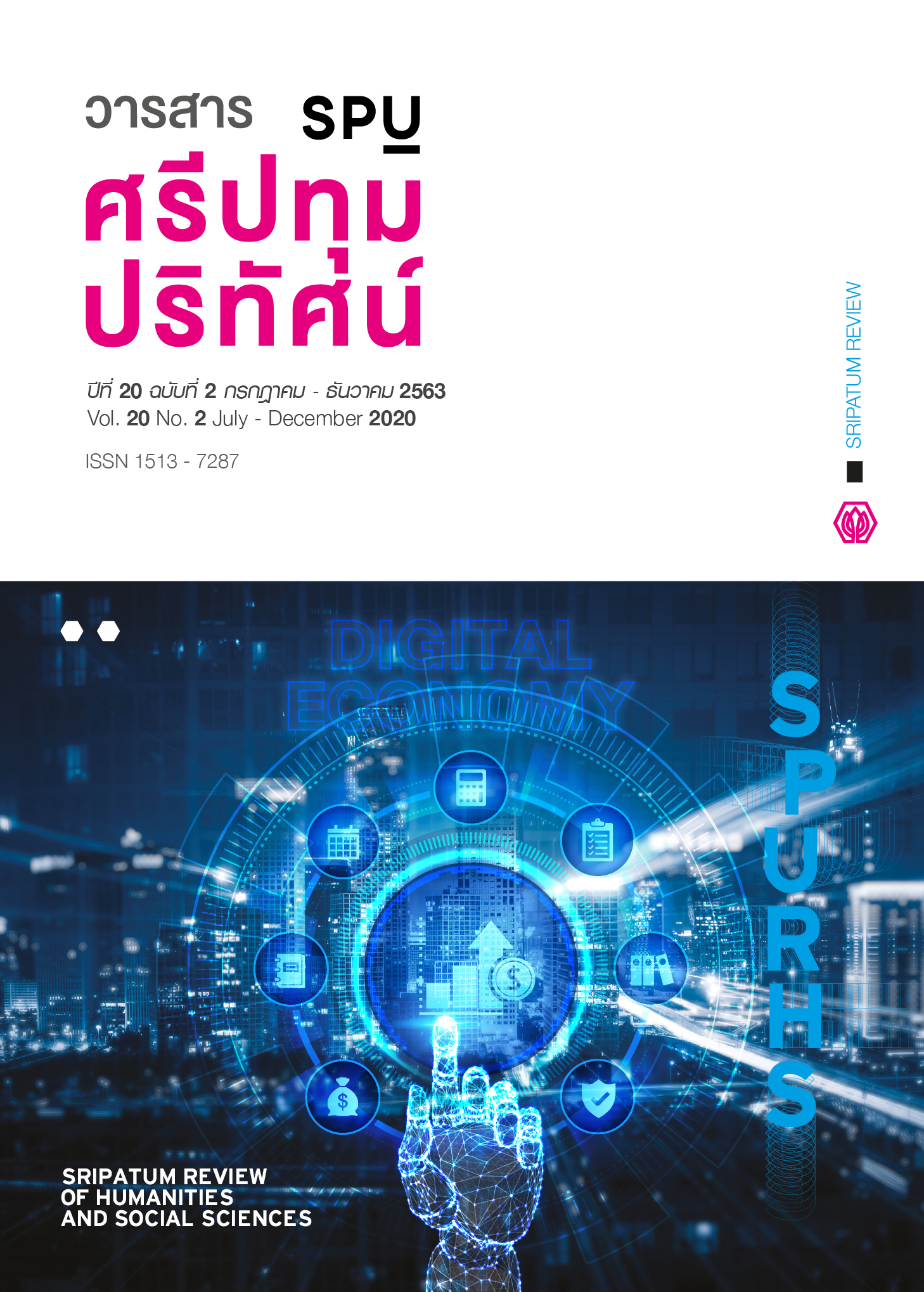กลยุทธ์ทางการทหารในการเสริมสร้างศักยภาพภาวะผู้นำแห่งกองทัพบก (Military Strategies for Strengthening the Army Leadership Potential)
Main Article Content
บทคัดย่อ
การวิจัยครั้งนี้มีวัตถุประสงค์เพื่อ (1) ศึกษาระดับของกลยุทธ์ทางการทหาร (2) ศึกษาอิทธิพลของกลยุทธ์ทางการทหารที่มีผลต่อศักยภาพภาวะผู้นำแห่งกองทัพบก และ (3) เสนอแนวทางในการพัฒนาศักยภาพภาวะผู้นำแห่งกองทัพบก การวิจัยนี้เป็นการวิจัยเชิงปริมาณ ตัวอย่าง คือ ผู้บริหารระดับสูง จำนวน 260 คน ในกองทัพภาคที่ 1–4 จาก 46 ค่าย ใช้วิธีการสุ่มตัวอย่างแบบแบ่งชั้นภูมิ ใช้แบบสอบถามในการเก็บข้อมูล วิเคราะห์ข้อมูลโดยใช้โมเดลสมการโครงสร้าง ผลการวิจัยพบว่า (1) กลยุทธ์ทางการทหาร ได้แก่ การพัฒนาความรู้ความสามารถ การสร้างสรรค์นวัตกรรม การมีวิสัยทัศน์ก้าวไกล การสร้างพันธมิตรในกองกำลัง กลยุทธ์ทางการทหาร ความสามารถใน การตัดสินใจ และศักยภาพภาวะผู้นำแห่งกองทัพบกอยู่ในระดับมาก ส่วน การบูรณาการเทคโนโลยี การยึดมั่นในคุณธรรมจริยธรรม อยู่ระดับปานกลาง (2) กลยุทธ์ทางการทหาร มีอิทธิพลต่อศักยภาพภาวะผู้นำแห่งกองทัพบก อย่างมีนัยสำคัญทางสถิติที่ระดับ 0.05 โดยทุกตัวแปรสามารถร่วมทำนายศักยภาพภาวะผู้นำแห่งกองทัพบก ร้อยละ 88 และ (3) แนวทางการพัฒนาศักยภาพภาวะผู้นำแห่งกองทัพบก ผ่านกลยุทธ์ทางการทหาร ใน 3 ด้าน คือ (1) พัฒนาความรู้ ความสามารถในการบูรณาการเทคโนโลยี และการตัดสินใจที่รวดเร็วแม่นยำ (2) แสดงวิสัยทัศน์ ของผู้นำที่สะท้อนให้เห็นศักยภาพภาวะผู้นำทางการทหารที่ทันสมัย เพื่อเสริมสร้างให้ผู้ใต้บังคับบัญชาเชื่อมั่น และ (3) ใช้กลยุทธ์สนับสนุนการปฏิบัติงาน ด้วยการยึดมั่นในคุณธรรมจริยธรรม และ การสร้างพันธมิตรในกองกำลังระดับองค์กรของกองทัพบก
Article Details
1. กองบรรณาธิการสงวนสิทธิ์ในการพิจารณาและตัดสินการตีพิมพ์บทความในวารสาร
2. บทความทุกเรื่องจะได้รับการตรวจสอบทางวิชาการโดยผู้ทรงคุณวุฒิ แต่ข้อความและเนื้อหาในบทความที่ตีพิมพ์เป็นความรับผิดชอบของผู้เขียนแต่เพียงผู้เดียว มิใช่ความคิดเห็นและความรับผิดชอบของมหาวิทยาลัยศรีปทุม
3.การคัดลอกอ้างอิงต้องดำเนินการตามการปฏิบัติในหมู่นักวิชาการโดยทั่วไป และสอดคล้องกับกฎหมายที่เกี่ยวข้อง
เอกสารอ้างอิง
Announcement of the Office of the Prime Minister for Military Officers. (2016). Government Gazette Volume 133, Special section 203, pages 1-45. [Online]. Retrieved September 19 2016, from: http://www.ratchakitcha.soc.go.th/DATA/PDF/2559/E/067/1.PDF (in Thai)
Abney, A. C. (2016). Authentic Leadership: A Model for Professional Moral Courage. Thesis of the Degree of Doctor of Philosophy Program in Organizational Leadership, Virginia, USA: Regent University.
Ayers, R. B. (2016). Optimizing workforce performance: Perceived differences of army officer critical thinking talent across level of education.
Ball, R. D. (2016). Ethical leadership under duress: An exegetical study of Daniel 1-6. Thesis of the Degree of Doctor of Philosophy Program in Business & Leadership. Virginia, USA: Regent University.
Benmelech, E., and Frydman, C. (2015). Military ceos. Journal of Financial Economics, 117(1), 43-59.
Dunwoody, A. (2015). A Higher Standard: Leadership Strategies from America's First Female Four-star General. Boston, MA: Da Capo Press.
Department of the Army Personnel. (2017). Documentation for the Army Personnel Competency Development Project. Bangkok: Education Division Department of the Army Personnel. (in Thai) [n.p.]
Emmett, E. (2016). Ethical behavior, Leadership, and Decision-Making Walden University.[Online]. Retrieved September 19, 2016, from: http://scholarworks.waldenu.edu
Heineman, J. A. (2016). Supporting veterans: Creating a “military friendly” community college campus. Community College Journal of Research and Practice, 40(3), 219-227.
Hill, R. L. (2016). Factors affecting college choice and transfer: A study of the decision-making process of student veterans. [Online]. Retrieved December 9, 2019, from: http://digitalcommons.odu.edu/cgi/viewcontent.cgi?article=1008&context=efl_etds
Huang, J. Y. C. (2016). When opportunity doesn't knock: examining military non-investment in emerging technologies. Thesis of the Degree of Doctor of Philosophy Program in International Affairs, Science, and Technology. Georgia, USA: Georgia Institute of Technology.
Kirchner, M. J. (2018). Veteran as leader: The lived experience with US Army leader Development. Human Resource Development Quarterly, 29(1), 67-85.
Lucke, G. A. and Furtner, M. R. (2015). Soldiers lead themselves to more success: A self-leadership intervention study. Military Psychology, 27(5), 311-324.
Miranda, R. H. (2016). The Correlation Between Emotional Intelligence and Decision Making Among Military Police Officers. (2016). [Online]. Retrieved December 21,2019, from: https://digitalcommons.brandman.edu/edd_dissertations/89
Morgenthaler, J. (2015). The courage to take command: Leadership lessons from a military trailblazer. New York, USA.: McGraw-Hill Education.
Puwapatthanadol, T. (2019). The Strategies of Developing High Class Educational Institutes of The Royal Thai Army Towards Organizations in The Era of Thailand 4.0. Sripatum Review of Humanities and Social Sciences, 19(2), 21-24. (in Thai)
Samuels, S. M., Foster, C. A., and Lindsay, D. R. (2010). Freefall, self-efficacy, and leading in dangerous contexts. Military Psychology, 22(1), S117-S136.
Snider, D. M. (2005). The future of the army profession. L. J. Matthews (Ed.). Boston: McGraw-Hill.
Waldrop, M. S. (2016). Understanding Women Leaders in a Male-Dominated Profession: A Study of the United States Marine Corps’ Women Generals. Thesis of the Degree of Doctor of Philosophy. California, USA: University of San Diego. [Online]. Retrieved from: https://digital.sandiego.edu/dissertations/60


